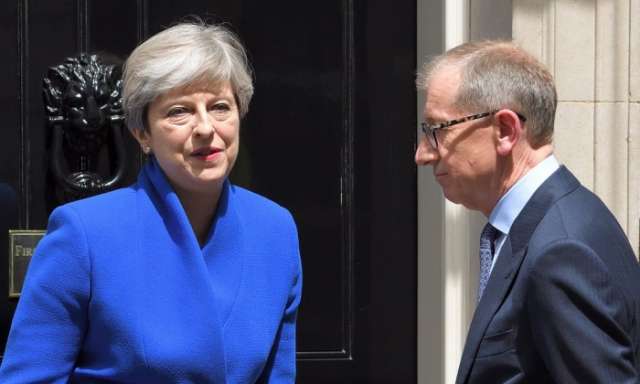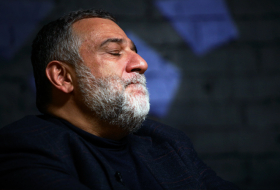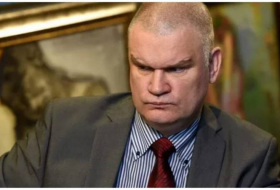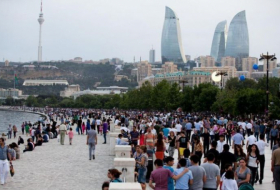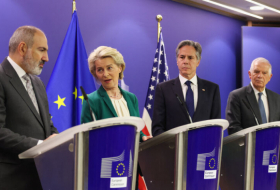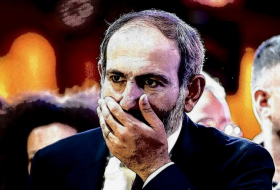The memory of Gordon Brown fatally bottling an early election clearly has something to do with it, as does a hideously flawed campaign spent mainly hiding from voters. But that’s not the whole story, and in the gaps lies some explanation of why Theresa May is still clinging, limpet like, to power, although few expect her now to do so for long.
The seeds of this downfall were sown long before the election. For months Tory aides and MPs have been biting back complaints about May’s co-chiefs of staff, Fiona Hill and Nick Timothy, but as power ebbs away from the prime minister they no longer have much to fear. Colleagues who for months felt compelled to put up with vituperative texts and treatment some regard as frankly intimidating now paint a picture of an inner circle by turns aggressive and defensive, stubbornly resistant to advice, and prone to driving away people who could have helped. “It’s all very well making yourself into this presidential figure but the risk is that everyone just leaves you to it. A lot of us were pretty quiet during the campaign because we took the view that ‘It’s all yours, love’,” says one senior Tory MP. “Unfortunately that means there aren’t many people to defend you when it gets difficult.”
An ex-staffer, meanwhile, says anyone bringing bad news was treated as “unhelpful, disloyal, not Team May – the behaviour if you spoke up was just so bad, you shut up”. Consultation on the manifesto was sketchy, and once it became clear the campaign was misfiring few dared step in. Some wonder too if the slavish adoration of the Daily Mail and the Sun was ultimately unhelpful, encouraging Downing Street to overestimate May’s popularity.
But the fatal mistake was surely not grasping how fundamentally the political landscape had been redrawn post-Brexit. The Conservative party did not collapse on Thursday: May’s 42% share of the vote was not enormously far off initial expectations. What they missed was the scale, in a two-horse race, of the popular revolt that boosted Jeremy Corbyn’s.
Like Hillary Clinton, May made her pitch primarily on grounds of competence, presenting herself as the solid, experienced-if-unexciting choice up against a volatile novice “learning on the job”. The U-turn over social care dented that reputation, but overall she did a reasonable job of selling herself as the grownup in the room – the quality that worked so well for her in the panicky, meltdown days after the EU referendum.
What Clinton should have told us, however, is that millions of voters don’t want a grownup droning on about things they can’t have: they want a leader willing to push the limits of the possible. Beneath the radar, this had become yet another anti-establishment election, in which the vicar’s daughter could not have been a more establishment candidate; and Corbyn’s team either spotted that sea change or got lucky. Along with most of the media and political classes, May’s, apparently, did not. In retrospect, a candidate who likes to make a plan thoroughly in advance and then stick to it may have been unsuited to moving with volatile and fast-changing times. And that’s one reason few Conservative MPs expect her to stay for the long term.
Her authority is now drastically weakened: without a majority, controversial policies from grammar schools to social care reforms are effectively dead in the water and Tory remainers are already demanding a rethink on Brexit. “Many of us will be saying, ‘Well, we tried the Ukippy thing and look what happened, and we’re not doing it any more’,” says one well-placed ex-minster. “I think the single market and freedom of movement decisions are all back in play.” But Eurosceptics will resist furiously, as may her new DUP partners. If a Tory working majority of 17 wasn’t considered enough to get Brexit through, how can she possibly do it now?
The cabinet isn’t pushing for her to go, not least for fear that doing so now may risk handing the Downing Street keys to Jeremy Corbyn. But the growing expectation is that she will seek to consolidate the Tories’ grip on power by establishing an interim minority administration with the help of the DUP, and then at a later date announce a timetable for her departure, serving as caretaker prime minister until a successor is chosen.
The speed with which Tory modernisers began sketching out conditions for revival – rein in the hard Brexit talk, sweeten the austerity gruel, add a bit of what the former culture minister Ed Vaizey called “magic dust” and optimism – suggests some hard thinking is already under way. What they’re lacking is a candidate sufficiently “disruptive” and unconventional, as one backbencher puts it, to win what most assume will ultimately be a second general election against Corbyn before too long. (Scottish Tory leader Ruth Davidson would have to fight a Westminster byelection first; Michael Gove and Boris Johnson are mentioned, but that could feel like a re-run of last summer.) The potential for things to get spectacularly messy is obvious.
Yet the fascinating thing about Thursday night’s revolt is that, subversive as it was, in some senses it has brought us closer to the old status quo. The union, teetering on the brink so recently, may be safer now than for years, with the prospects of a second independence referendum receding thanks to the SNP’s losses. Brexit could yet be watered down. If young people are voting again, that restores a generational balance we once took for granted. All the pieces have been thrown in the air again, but they’re falling into patterns that look oddly familiar.
After the storm, some calm? By now, anyone involved in politics should be wary of making predictions. But perhaps the only thing left that could possibly surprise us is the return of the unsurprising.
Gaby Hinsliff is a Guardian columnist and former political editor of the Observer.
More about: #GeneralElection2017








